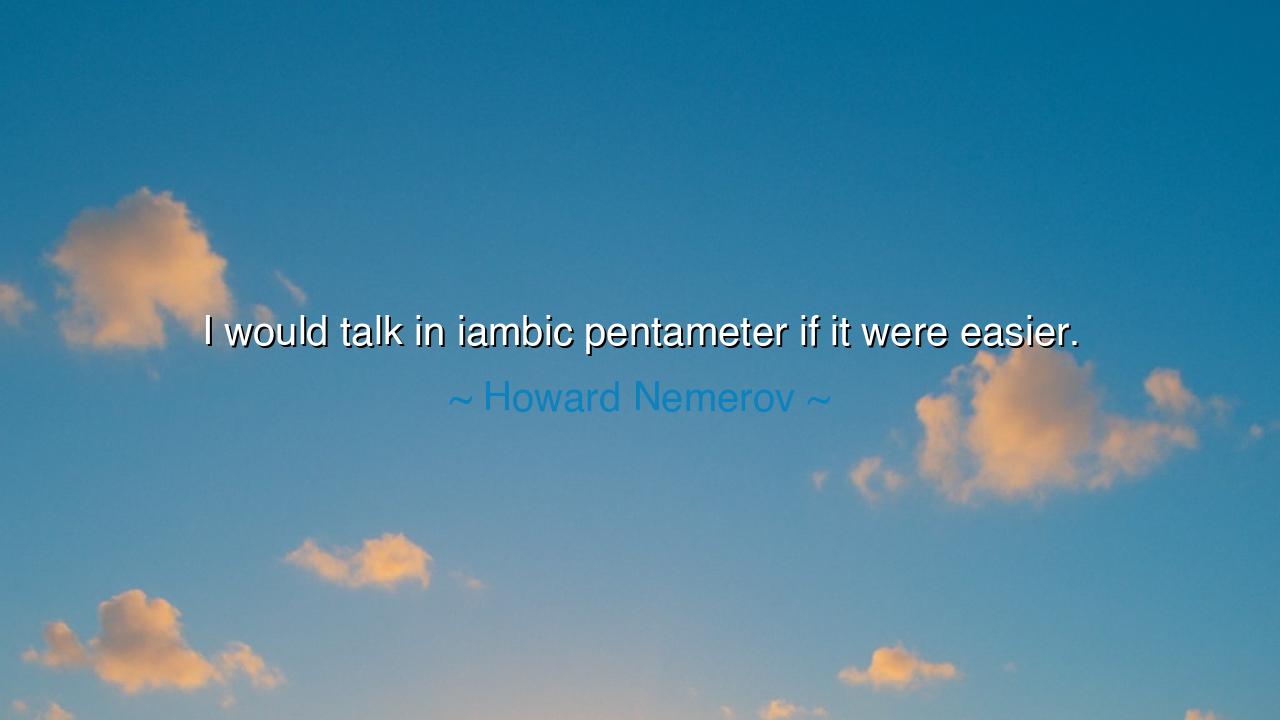
I would talk in iambic pentameter if it were easier.






“I would talk in iambic pentameter if it were easier.” — Howard Nemerov
In this line of elegant wit, Howard Nemerov, the American poet laureate and philosopher of verse, expresses a truth that shimmers beneath its humor: that beauty and discipline in expression are the highest forms of thought — yet they demand an effort few are willing to bear. To speak in iambic pentameter, the rhythmic heartbeat of English poetry, would be to give every utterance grace, order, and resonance — to turn even conversation into art. And yet, Nemerov concedes, it is not easy. His jest, therefore, is not a boast but a confession: that the pursuit of beauty, in speech or in life, is a struggle, but one worth aspiring toward.
The origin of this quote lies in Nemerov’s lifelong devotion to form and craft. A poet of the twentieth century, writing in an age of free verse and rebellion, he remained loyal to the old architecture of poetry — to rhythm, symmetry, and meter. The iambic pentameter, that noble measure of Shakespeare and Milton, was to him not a constraint but a harmony. It was the music of reason, the balance of sound and sense. When he said he would “talk” in it if he could, he meant that he longed for life itself to have such balance — that the words we speak, the choices we make, might all move with a rhythm that gives dignity to existence.
To understand his meaning, one must first know what iambic pentameter is — a line of ten syllables, alternating between soft and strong beats: da-DUM da-DUM da-DUM da-DUM da-DUM. It is the rhythm of the English heart, the natural pulse of our speech elevated to poetry. The ancients would have called it measure, that divine order which brings form to chaos. In Nemerov’s eyes, to speak in such measure was to live with grace — to have one’s words aligned with wisdom, one’s speech disciplined by beauty. It was the dream of harmony between thought and sound, mind and music, soul and structure.
The ancients sought this harmony too. In Greece, Pythagoras taught that the cosmos itself was built on music — the harmony of the spheres. To live rightly, he said, was to tune the soul as one tunes an instrument, balancing emotion with reason, passion with restraint. Nemerov’s longing is born of that same wisdom. His jest about speaking in iambs is, in truth, a metaphor for the moral rhythm of life: that to live beautifully, one must learn to move in measure, to balance one’s impulses with reflection, to turn the raw material of existence into something shaped, deliberate, and melodious.
And yet, he admits — “if it were easier.” Here lies the humility of the poet, the eternal tension between vision and reality. For beauty, whether in art or in character, demands discipline. It is easier to speak without rhythm, to live without structure, to pour forth words or emotions without regard for harmony. The poet, however, yearns for more — to weave the chaos of life into music. In this, Nemerov reminds us that effort is the price of elegance. The ease of mediocrity tempts every soul, but the nobility of art — and of living artfully — requires the courage to strive for form, even when it is difficult.
Consider William Shakespeare, who, through iambic pentameter, turned human speech into immortal melody. His lines, spoken by kings and fools alike, captured the heartbeat of humanity. He too might have laughed at Nemerov’s jest, for he understood that rhythm is not confinement but liberation — that the measured line gives freedom to meaning, just as a river’s banks give direction to the flow. Shakespeare’s speech, so natural yet divine, proves the truth behind Nemerov’s desire: that when expression finds its perfect rhythm, it transcends time itself.
So, my child, take this teaching to heart. Strive for rhythm in your life and words. Let your speech carry grace, your actions follow pattern, your thoughts find balance. Do not fear the discipline that beauty demands, for it is through structure that the spirit finds its fullest voice. Speak not hastily, but with purpose; act not chaotically, but with harmony. You may not always “talk in iambic pentameter,” but you can live with its spirit — poised, balanced, resonant.
For this is what Nemerov teaches: that the highest art is not only in poetry, but in life itself. To speak beautifully is to think beautifully; to think beautifully is to live wisely. And though it may never be easy, it is the pursuit that ennobles the human heart. Seek, then, the rhythm in all things — in love, in labor, in laughter — and your life, like poetry well measured, will echo in harmony long after the voice itself has fallen silent.






AAdministratorAdministrator
Welcome, honored guests. Please leave a comment, we will respond soon